 My husband just took a moment now before bed to read to me from page 250 of Alejandro Varela’s The Town of Babylon. And it is an incredible page. The narrator is describing why his hometown of Babylon, Long Island makes him uneasy, despite what would seem like improvements to the town ever since he grew up there, 20 years before. It’s a riff from the narrator that moves into a meditation on the way American history created the American present, and it has a sort of music to it that binds all of this up in a song on the page, a kind of fugue for forgotten homelands and dreams. I listened as I don’t think I’ll get suck of it—this was one of my favorite novels this last year, and I felt a thrill when he was selected for the National Book Award long list and short list.
My husband just took a moment now before bed to read to me from page 250 of Alejandro Varela’s The Town of Babylon. And it is an incredible page. The narrator is describing why his hometown of Babylon, Long Island makes him uneasy, despite what would seem like improvements to the town ever since he grew up there, 20 years before. It’s a riff from the narrator that moves into a meditation on the way American history created the American present, and it has a sort of music to it that binds all of this up in a song on the page, a kind of fugue for forgotten homelands and dreams. I listened as I don’t think I’ll get suck of it—this was one of my favorite novels this last year, and I felt a thrill when he was selected for the National Book Award long list and short list.
This page is near the end of the novel—my husband has been reading the novel all last month, and it came with us out to Los Angeles for the holiday, where I could look out to my brother’s patio and see him reading it on a chair in the distance.
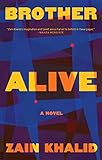
 I myself have lately been reading my student’s final projects from Intermediate Fiction. Many of them wrote about Zain Khalid’s Brother Alive, another novel I loved this year, and which I taught alongside Lisa Halliday’s Asymmetry. It is one of the most original novels in recent memory that I’ve read. When I teach Intermediate Fiction for undergraduates I try problematizing their idea of what fiction is, and what form is, and invite them to take some risks. It was interesting to see the novel come back to me through the prism of my students experiences with it, in discussion, and in their essays. But it’s difficult to teach a novel you feel passionately about you run the risk of seemingly like the friend who wants you to like something a lot. Which can backfire.
I myself have lately been reading my student’s final projects from Intermediate Fiction. Many of them wrote about Zain Khalid’s Brother Alive, another novel I loved this year, and which I taught alongside Lisa Halliday’s Asymmetry. It is one of the most original novels in recent memory that I’ve read. When I teach Intermediate Fiction for undergraduates I try problematizing their idea of what fiction is, and what form is, and invite them to take some risks. It was interesting to see the novel come back to me through the prism of my students experiences with it, in discussion, and in their essays. But it’s difficult to teach a novel you feel passionately about you run the risk of seemingly like the friend who wants you to like something a lot. Which can backfire.
 I read the Khalid and the Varela in the early months of the year, when I was otherwise in a forest made of essays while I put the finishing touches to my final selections for Best American Essays 2022. Because this was so much to read, if I still felt the need for the absorbing embrace of a story, and I did, I often read comics and graphic novels, or fiction, of course, to air out my mind. Much of my year is spent reading a little out of sync with the world because I am sent books in advance to blurb or review, and then I am often unable to discuss these books read in advance because only a few people have read them but there’s almost no way to tell who they are. One of the best experiences I had all year with a novel was one I read for someone’s tenure case at another school, for example, a novel long awaited by many of us, and I can’t say the author here as a result but yes, I supported that case without trying to seem like that aforementioned friend who wants you to like something too much. So it’s a kind of slightly manic loneliness to read like this, quite often.
I read the Khalid and the Varela in the early months of the year, when I was otherwise in a forest made of essays while I put the finishing touches to my final selections for Best American Essays 2022. Because this was so much to read, if I still felt the need for the absorbing embrace of a story, and I did, I often read comics and graphic novels, or fiction, of course, to air out my mind. Much of my year is spent reading a little out of sync with the world because I am sent books in advance to blurb or review, and then I am often unable to discuss these books read in advance because only a few people have read them but there’s almost no way to tell who they are. One of the best experiences I had all year with a novel was one I read for someone’s tenure case at another school, for example, a novel long awaited by many of us, and I can’t say the author here as a result but yes, I supported that case without trying to seem like that aforementioned friend who wants you to like something too much. So it’s a kind of slightly manic loneliness to read like this, quite often.
 Heinz Insu Fenkl’s newest novel, Skull Water, came to me this way almost six months ago now, and is due out early in 2023. This is a follow-up to his 1996 debut, Memories of My Ghost Brother, though each stands alone. Fenkl is, like myself, a Korean American writer of Korean and white parents, and he writes about the poor and working class in Seoul in these books, especially those making a living by serving the American and international military garrisons there. While many Korean American writers cite me as one of the first KA writers they have found, Fenkl was that for me. He was one of the early voices out there, along with Nora Okja Keller, and so his return with a new novel is exciting. His novels do not need to be read together, and you can read this new one without having read the earlier first, but there’s an effect you’ll get if you read the second one first. A prequel effect for this age of prequels.
Heinz Insu Fenkl’s newest novel, Skull Water, came to me this way almost six months ago now, and is due out early in 2023. This is a follow-up to his 1996 debut, Memories of My Ghost Brother, though each stands alone. Fenkl is, like myself, a Korean American writer of Korean and white parents, and he writes about the poor and working class in Seoul in these books, especially those making a living by serving the American and international military garrisons there. While many Korean American writers cite me as one of the first KA writers they have found, Fenkl was that for me. He was one of the early voices out there, along with Nora Okja Keller, and so his return with a new novel is exciting. His novels do not need to be read together, and you can read this new one without having read the earlier first, but there’s an effect you’ll get if you read the second one first. A prequel effect for this age of prequels.
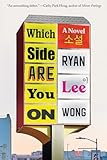
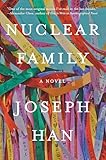
 And meanwhile, Korean American fiction is exploding. This year we got Ryan Lee Wong’s Which Side Are You On, Joseph Han’s Nuclear Family, and Soon Wiley’s When We Fell Apart. All also came to me as advance copies, and I loved them all. These novels are about, respectively, the legacy of the Los Angeles Riots, the DMZ, and homophobia, and all were ambitious, thought provoking novels that left me feeling a certain old fashioned way after I read them, like I’d grown. Wong’s novel is one I want to send to all my Asian American activist students and friends l, especially for the way it models an intergenerational conversation about activism. Han’s novel had me smiling with my heart in my throat as it asked brilliant questions about where we belong and what exactly we owe our ancestors. Wiley’s was a structural genius, pushing the novel’s form beautifully in the sort of story that could have so easily, too easily, never been a story–told from two different characters sides, with two different relationships to time. I would add Jimin Han’s The Apology here, though like Skull Water, it does not come out until 2023. Han’s novel, set in Korea and America, is about an ajumma who is determined to keep taking care of her family from beyond the grave, whether they want her to or not. It’s also a great novel to read if you ever wanted, say, more novels from Iris Murdoch (I am like this).
And meanwhile, Korean American fiction is exploding. This year we got Ryan Lee Wong’s Which Side Are You On, Joseph Han’s Nuclear Family, and Soon Wiley’s When We Fell Apart. All also came to me as advance copies, and I loved them all. These novels are about, respectively, the legacy of the Los Angeles Riots, the DMZ, and homophobia, and all were ambitious, thought provoking novels that left me feeling a certain old fashioned way after I read them, like I’d grown. Wong’s novel is one I want to send to all my Asian American activist students and friends l, especially for the way it models an intergenerational conversation about activism. Han’s novel had me smiling with my heart in my throat as it asked brilliant questions about where we belong and what exactly we owe our ancestors. Wiley’s was a structural genius, pushing the novel’s form beautifully in the sort of story that could have so easily, too easily, never been a story–told from two different characters sides, with two different relationships to time. I would add Jimin Han’s The Apology here, though like Skull Water, it does not come out until 2023. Han’s novel, set in Korea and America, is about an ajumma who is determined to keep taking care of her family from beyond the grave, whether they want her to or not. It’s also a great novel to read if you ever wanted, say, more novels from Iris Murdoch (I am like this).

 Especially dear to me was Elizabeth McCracken’s The Hero Of This Story, a short masterful novel of the kind you read late at night before bed and then it keeps you up late. It is also a great comfort to anyone who has lost someone, as I found, when I gave it to a friend whose spouse had died recently. And it might teach you a few things about fiction writing if you’re into that sort of thing. This was also the year I found Clare Sestanovich, a new favorite short story writer, and then I ran out to get her collection Objects of Desire.
Especially dear to me was Elizabeth McCracken’s The Hero Of This Story, a short masterful novel of the kind you read late at night before bed and then it keeps you up late. It is also a great comfort to anyone who has lost someone, as I found, when I gave it to a friend whose spouse had died recently. And it might teach you a few things about fiction writing if you’re into that sort of thing. This was also the year I found Clare Sestanovich, a new favorite short story writer, and then I ran out to get her collection Objects of Desire.



 When I am too tired to read, I put on audiobooks. My husband took Garth Greenwell’s Dancer From The Dance class this last summer, and the conversations I overheard him having on Zoom had me downloading the audiobook–I hadn’t even looked at the novel in such a long long time, but had just read his most recent novel, Kingdom of Sand, which made for a fascinating contrast. Lost In The City, by Edward P. Jones, is a favorite collection I first encountered over a decade ago, and the audiobook brought the stories to a new and vivid life. And Venita Blackburn’s How To Wrestle A Girl is a brilliant new collection of short stories, with recordings by Blackburn and some other vocal actors who do well by her. Blackburn is another of my new favorite short story writers,
When I am too tired to read, I put on audiobooks. My husband took Garth Greenwell’s Dancer From The Dance class this last summer, and the conversations I overheard him having on Zoom had me downloading the audiobook–I hadn’t even looked at the novel in such a long long time, but had just read his most recent novel, Kingdom of Sand, which made for a fascinating contrast. Lost In The City, by Edward P. Jones, is a favorite collection I first encountered over a decade ago, and the audiobook brought the stories to a new and vivid life. And Venita Blackburn’s How To Wrestle A Girl is a brilliant new collection of short stories, with recordings by Blackburn and some other vocal actors who do well by her. Blackburn is another of my new favorite short story writers,
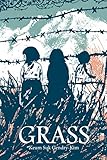
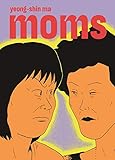

 About some of those graphic novels I read: I won’t ever forget Keum Suk Gendry-Kim’s The Grass, Yeong-shin Ma’s Moms, and Kate Beaton’s Ducks. Each is fairly different from the other, but all could be said to be about working class women trying to survive men and each other. R. Kikuo Johnson’s No One Else is more about a life spent in the blind spot of the men in the family—I’ve seen reviews say the son in the story is the central character, but to me he seemed to be the witness to all of the ways these men, including him, his grandfather and his uncle, all simply do not recognize the struggle of his mother.
About some of those graphic novels I read: I won’t ever forget Keum Suk Gendry-Kim’s The Grass, Yeong-shin Ma’s Moms, and Kate Beaton’s Ducks. Each is fairly different from the other, but all could be said to be about working class women trying to survive men and each other. R. Kikuo Johnson’s No One Else is more about a life spent in the blind spot of the men in the family—I’ve seen reviews say the son in the story is the central character, but to me he seemed to be the witness to all of the ways these men, including him, his grandfather and his uncle, all simply do not recognize the struggle of his mother.



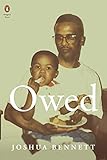



 And amid all of this fiction there were memoirs. Lars Horn’s The Voice Of A Fish was one of those books that left me changed—a memoir in essays of Horn’s experiences before and after transitioning, before and after leaving Russia, and otherwise fairly hard to summarize except by saying the writing, sentence for sentence, is extraordinary. Another standout was Ma and Me by Putsata Reang, a queer Khmer woman who came out to her mother, and faced her mother’s painful rejection of her—she feels her daughter owes her a Khmer husband and grandchildren. Fear of social death keeps many Asians and Asian Americans closeted, and so I’m grateful for Reang for writing so honestly about making this choice. And there was some breathtaking poetry-books like Matthew Olzmann’s Constellation Route, Joshua Bennet’s Owed, Yanyi’s Dream of a Divided Field, Paul Tran’s All the Flowers Kneeling, and Ocean Vuong’s Time Is a Mother. Franny Choi’s The World Keeps Ending just came in the mail and is next for me.
And amid all of this fiction there were memoirs. Lars Horn’s The Voice Of A Fish was one of those books that left me changed—a memoir in essays of Horn’s experiences before and after transitioning, before and after leaving Russia, and otherwise fairly hard to summarize except by saying the writing, sentence for sentence, is extraordinary. Another standout was Ma and Me by Putsata Reang, a queer Khmer woman who came out to her mother, and faced her mother’s painful rejection of her—she feels her daughter owes her a Khmer husband and grandchildren. Fear of social death keeps many Asians and Asian Americans closeted, and so I’m grateful for Reang for writing so honestly about making this choice. And there was some breathtaking poetry-books like Matthew Olzmann’s Constellation Route, Joshua Bennet’s Owed, Yanyi’s Dream of a Divided Field, Paul Tran’s All the Flowers Kneeling, and Ocean Vuong’s Time Is a Mother. Franny Choi’s The World Keeps Ending just came in the mail and is next for me.
I have many more favorites than this but we’re all out of word space. But if you want more, you can sign up for me to just send you favorite books in the mail, along with presents (you have to pay the nice people at Boxwalla) or buy a copy of Best American Essays 2022 and check out every book by the writers I included there. I also dropped off suggestions with the nice editors at n+1 for their Book Match fundraiser.









